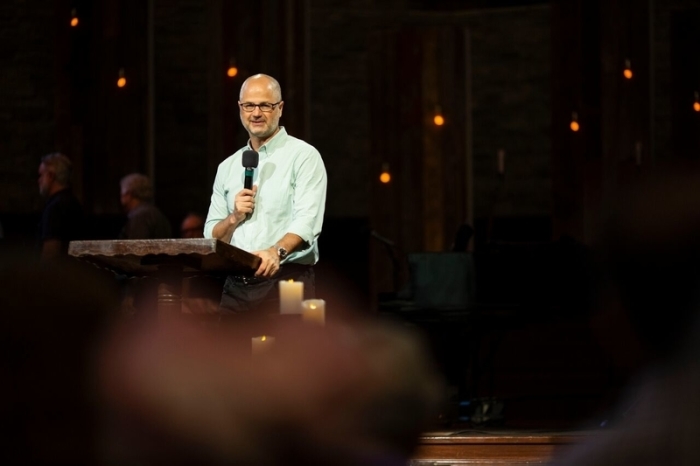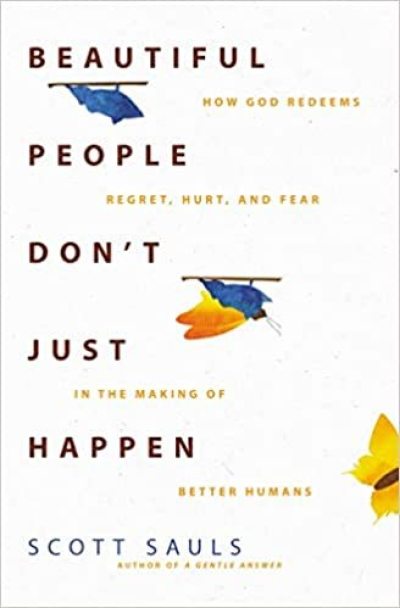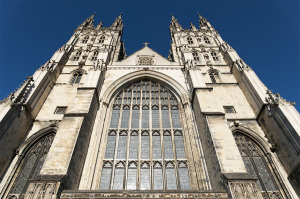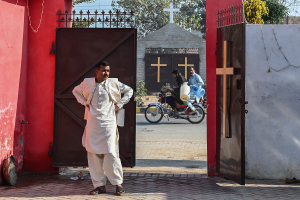Pastor Scott Sauls shares keys to combatting anxiety, depression: Resurrection 'changes everything'

In a society rife with anxiety, depression, regret and disappointment, Pastor Scott Sauls is on a mission to encourage believers that God can redeem even the deepest pains — but it requires engaging in community both with Him and others.
“We're coming out of a season where I think all of those burdens — regret, hurt, fear — have been amplified by all the things that the pandemic has brought into most people's realities,” Sauls, the pastor of Christ Presbyterian Church in Nashville, Tennessee, told The Christian Post.
“Community is upended, which ... does give evidence to people feeling disappointed and hurt by relationships that maybe don't feel as significant or committed or deep as we once thought or felt they were,” he continued. “And so I think that's been an alarming reality for a lot of people. … Everybody feels unmoored and kind of insecure, in general, because of what's been taken away from us, collectively and personally, by pandemic realities and everything that goes with it. I think it's just made people feel a lot less stable and a lot less certain.”
It was out of concern for the health of the Body of Christ that Sauls penned his forthcoming book, Beautiful People Don’t Just Happen: How God Redeems Regret, Hurt and Fear in the Making of Better Humans. The book is due out next month.
Sauls stressed that the answer to the hurt people feel today is the Gospel and being united with Christ.
“I wrote the book because of a general sense that people are in a disoriented, hard place,” he said. “That doesn't seem to be resolving, and I think the Gospel is the answer now as it's always been to those things.”
In his book, Sauls delves into how the Gospel helps believers give an honest voice to their emotions, combat debilitating thoughts, discover God’s heart for the brokenhearted, and genuinely live a life of contentment in any circumstance.
And he speaks from personal experience and is candid about his own struggles with negative self-talk, regret and how the divine counter-voice of God helps him respond to such thoughts.
“I still kind of kick myself for things I did decades ago, not just days ago, but decades,” he shared. “That kind of self-talk — that's the accuser entering into the picture and bringing up those memories and wanting to define us by our guilt and by our shame."
"Jesus died for those sorts of things and gave His life for those sorts of things so that we can know that it’s all cleared and we can be renewed with His forgiveness and grace," he added.
A key way to combat regret and pain and give an answer to negative thoughts, the pastor said, is becoming rooted in Scripture and "abiding" in Christ. He said pursuing Christ in the ordinary, mundane seasons of life daily prepares believers for the “cataclysmic moments where we feel our need for God the most.”

“It's like eating; reading the Bible and going to church, for instance — sometimes not incredibly exciting, you just do it because you believe what God says, that He's going to use it," he said. "It's not going to return to Him not accomplishing something, it's not going to come back to Him void."
Scripture provides numerous examples of giving a voice to anger, sadness and regret in a healthy way, Sauls stressed.
He said even negative emotions are given by God — but navigating them well takes wisdom.
“In a lot of the Western world, especially, we want to run away from sadness as fast as we can,” he contended.
“We want to medicate it. We want to numb it. We want to addict ourselves to things that will enable us to run away from this precious emotion that God has put in us as sort of a release valve to enable us to express our distress over how the world is."
He said how the world is "because of the fall" is not the world that it will be in "the new Heaven and the new earth.”
“So, we're stuck in this in-between time, and we need healthy ways to express the sorrow,” Sauls said.
One healthy expression of sorrow is lament, an action Sauls described as the "produce of distressed emotion." He said lament is modeled by biblical heroes from the Prophet Jeremiah to King David in the book of Psalms.
"There's a huge difference between cynicism on the one hand and just flat out negativity and just kind of that sourpuss sort of approach to the world and … legitimate, humble expression of hurt,” he said.
“I'm trying to encourage more honest expression of things like sorrow, which are also an invitation to relationship.”
He encouraged Christians to share their sorrows and hurts with others in their communities and cultivate transparency in relationships, emphasizing that “we are not meant to suffer alone.”
“I'm trying to provide space and maybe even permission for people who are reluctant because [they] don't want to be a burden to anybody,’ meanwhile, you're really dying inside, and that's not a good thing either,” he said.
“Another thing that I’ve found in my years as a pastor is that if you're going to confide your sorrows to me and my wife, it's actually going to make us freer to live honestly with you. And so there's a mutual healing effect as long as none of us falls into cynicism and negativity and spiteful, victim-entitlement attitudes, but instead, we just legitimately enter into the sorrow of what it means to live in a fallen world.”’
Though there are “complex reasons” people are hesitant to enter into the pain of others, Sauls said that in his experience, “everybody’s wired to be a caregiver.”
“We were made to care,” he said, citing the story in John 4 where Jesus asks the Samaritan woman for a drink.
“It may be awkward to try to enter into that as a way of life of giving and receiving care, but that's what real community is, so it's worth a try,” he said.
Until Christ’s return, this fallen world will be riddled with regret, pain and hurt — but Christians don’t have to live burdened by this reality. Instead, Sauls said, they can find contentment and peace despite their circumstances through the hope of the Gospel and community with others.
He quoted The Lord of the Rings to remind believers that, ultimately, “everything sad is going to come untrue” due to Christ’s resurrection.
“The Gospel is something that is rooted in time, space, history and verified by over 500 eyewitnesses who claimed to have encountered Jesus Christ after He rose from the dead,” the pastor said. “And that changes everything.”
“The future is always brighter than the past or the present in Christ,” he added. “Our long-term worst-case scenario is the resurrection and everlasting life. And so no matter how bad it gets here, if somebody is in Christ, the best is always yet to come.”
Leah M. Klett is a reporter for The Christian Post. She can be reached at: leah.klett@christianpost.com





























